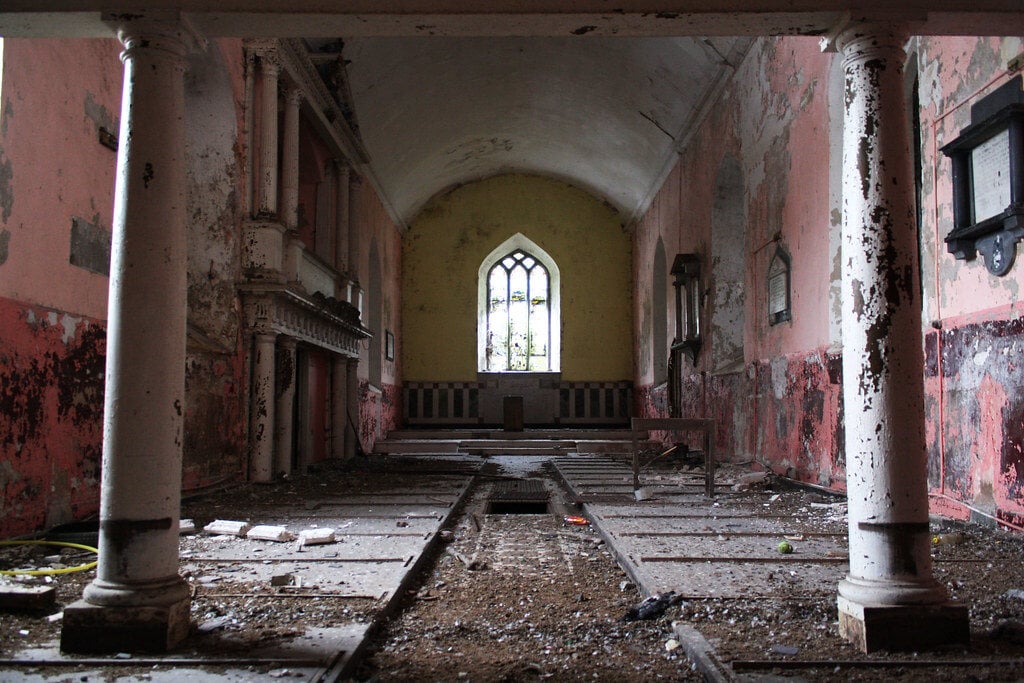“The Weekend Wanderer” is a weekly curated selection of news, stories, resources, and media on the intersection of faith and culture for you to explore through your weekend. Wander through these links however you like and in any order you like. Disclaimer: I do not necessarily agree with all the views expressed within these articles but have found them thought-provoking.

“The Great Dechurching Will Hurt Poor People” – Matthew Loftus at Mere Orthodoxy: “Members of mainline denominations as a percentage of the US population have dropped to the single digits. That’s bad news for the poor and vulnerable. Churchgoing is good for the poor and vulnerable in a variety of ways: it gives people moral guidance on how to live their lives. It gives them opportunities to directly serve others as a community. It results in tithes that are then spent on a wide variety of charitable works. These things are not salvation, and it is certainly possible for someone to be warming a pew for 50 years without a saving relationship with Jesus Christ. But any person is far more likely to find Jesus while nodding off in a pew than watching Netflix in bed. It’s brutal to look at any decline this severe in any set of churches. While some conservatives may feel the temptation to smugly remark about the results of theological liberalism, that feels about as appropriate as a lecture about the dangers of drug addiction during the funeral of a young person who died of an overdose. Conservative evangelicals are facing their own demographic challenges, and non-denominational megachurches are overtaking denominational identity. The Great Dechurching is bad news for all Christians, no matter how you slice it.”

“Ethan Hawke on Faith, Imagination and Flannery O’Connor” – Ashley McKinless interviews Ethan Hawke on the Jesuitical podcast: “It’s a very special week on ‘Jesuitical’—Ethan Hawke joins the podcast to discuss his new film, ‘Wildcat,’ about the Catholic writer Flannery O’Connor, who is portrayed in the film by Ethan’s daughter, Maya Hawke. Zac Davis, Ashley McKinless and Ethan share a wide-ranging and profound conversation about this great American writer and the work of bringing her to life in ‘Wildcat.’ They discuss:
- Ethan’s introduction to Flannery and the inspiration behind ‘Wildcat’
- Exploring religious questions through art
- Portraying Flannery’s complicated views on race
- Below is a lightly edited transcript of their conversation.”

“The Work of Art” – M. L. Sacasas at The Convivial Society: “Sometime last week, I began to see an image floating around social media featuring the following quotation from sci-fi/fantasy author, Joanna Maciejewska: ‘I want AI to do my laundry and dishes so that I can do art and writing, not for AI to do my art and writing so that I can do my laundry and dishes.‘1 It’s a perfectly understandable reaction, particularly from an artist, to much of what’s been sold and marketed as AI over the past year and a half. As I wrote last month, Apple’s ill-conceived ad, ‘Crush,’ had the (unintended) consequence of reinforcing the well-grounded fear that the big tech companies have little to no regard for artists and their work. But I found myself somewhat uncomfortable with the underlying logic of the expressed desire. It is the same logic that has underwritten the marketing of new technologies for more than a century, and, in my view, it is tragically flawed. I’ve written before about the problems with the logic of ‘time-saving’ or ‘labor-saving’ technologies, so I will simply point you to one of those posts, which includes the following observation: ‘Implicit in the promise of outsourcing and automation and time-saving devices is a freedom to be something other than what we ought to be. The liberation we are offered is a liberation from the very care-driven involvement in the world and in our communities that would render our lives meaningful and satisfying. In other words, the promise of liberation traps us within the tyranny of tiny tasks by convincing us to see the stuff of everyday life and ordinary relationships as obstacles in search of an elusive higher purpose—Creativity, Diversion, Wellness, Self-actualization, whatever.'”

“Nearly 300 ACNA clergy and a Texas diocese call for male-only priesthood” – Kathryn Post at Religion News Service: “At an Anglican theological conference in January, UK priest and political commentator The Rev. Calvin Robinson stirred up a long-simmering controversy when he called women’s ordination a ‘slippery slope’ akin to a ‘Trojan horse’ and to ‘cancer.’ ‘This is how the liberal infestation of the church began,’ Robinson insisted. ‘The doors were left open for the Marxist ideologies to gain a foothold, gender theory, queer theory, critical race theory — it all began with feminism.’ Robinson’s provocative remarks, delivered in an Anglican Church in North America diocese that ordains women, led to his removal from the remainder of the event. Months later, nearly 300 ACNA clergy have signed an open letter opposing women’s ordination to the priesthood, a wedge issue that has divided ACNA members since its inception in 2009, and an entire diocese has published a resolution calling for a moratorium on ordaining women. On May 26, ‘The Augustine Appeal’ appeared on the North American Anglican, a socially and theologically conservative publication. Authored by three ACNA priests and published weeks before ACNA elects its new leader, or Archbishop, the letter states that the ‘unresolved issue of women’s ordination to the priesthood imperils the mission of our Province.’ It also expresses hope that the College of Bishops will find ‘a creative solution to restore orthodoxy’ and institute a male-only priesthood. As of Friday (June 7), the appeal had been signed by 296 ACNA clergy.”

“John Mark Comer: How to Become a Hopeful Person” – John Mark Comer interviewed in Relevant: “We want to be optimistic. It’s just not always easy. John Mark Comer knows all about that. As an author and pastor, he’s spent years leading Bridgetown Church in Portland, Oregon, through a global pandemic, economic collapse, nation-wide uprisings for racial justice and rising political tension. He says he’s not inherently an optimist, but that’s OK. Comer is hopeful. To him, being hopeful is very different than being optimistic. It’s not a personality trait or even a way of looking at the world so much as it is a daily discipline that unites mind and heart. Comer sat down with RELEVANT to give his perspective on where the Church is heading and how to discipline yourself to become a hopeful person.”

“Highly Educated Men Are More Likely to be in Church Than Highly Educated Women” – Ryan Burge at Graphs About Religion: “Let me get this out of the way right up front – this post probably hangs together a bit less than other things I have written because it was more of a ‘stream of consciousness’ in terms of graphs than anything else. But I saw something in a piece of analysis that I couldn’t stop thinking about and wanted to make more sense of it by chasing some loose threads. Here’s the setup – educated people are more likely to attend religious services weekly than those with a lower level of education. I wrote a long piece about that a while ago entitled ‘Let’s Talk About Education and Religious Attendance.’ But someone (I can’t recall now, it was maybe in a Twitter reply) asked if that same relationship held for both men and women. And so I put together this piece of analysis. It’s just a simple graph of weekly attendance, broken down by level of education and gender. I tested it across multiple waves of the Cooperative Election Study. Here’s what I get.”
Music: Fernando Ortega, “This Is My Father’s World,” from Night of Your Return